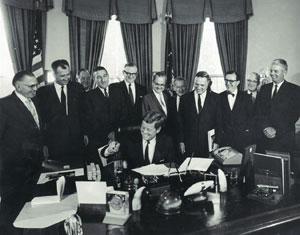sierraclub.org - sierra magazine - july/august 2012 - memories of a conservation giant: david brower at 100
David Brower at 100
By John de Graaf
 President Kennedy signs a law preserving Point Reyes National Seashore as David Brower (far right) looks on.
President Kennedy signs a law preserving Point Reyes National Seashore as David Brower (far right) looks on.
"Where are you?" Brower asked immediately. "At the Berkeley BART station," I replied. "Well, stay right there, I'll pick you up." A few minutes later, he was buying me lunch at Spenger's Fish Grotto, one of his favorite restaurants. That time, I was able to complete the film. For Earth's Sake: The Life and Times of David Brower, was PBS's 1990 Earth Day special. It wasn't an entirely flattering portrait, pointing out Brower's profligate spending habits at the Sierra Club and Friends of the Earth. Some of his friends thought it too critical of his mistakes, but not Brower. He was generous with his praise and asked if he could use my title for his autobiography, published later that year.
LEST A HERO BE FORGOTTEN
Brower's name now adorns a building in Berkeley, a sculpture at Kennesaw State University in Georgia, and the Brower Youth Awards, which are given annually to promising young environmentalists. But for all that he did for wilderness, it's nowhere to be found in the Sierra he loved, where the names of many lesser lights fill the topo maps.
A few years ago, John Knox and Dave Phillips, the co–executive directors of Earth Island Institute, asked me to lead an effort to name a Sierra peak for Brower. But which one? I suggested 14,242-foot North Palisade, Brower's favorite peak—he made the first winter ascent—and one with no easy route to the summit (I know this personally, having climbed it at age 17 and found Brower's name in the summit register). Its glacier, the Sierra's largest, is rapidly falling victim to global warming, about which he warned repeatedly.
My idea was to keep the Palisade part of the name, changing "North" to "Brower," since there is no South Palisade, and North Palisade isn't even the northernmost peak in the Palisade group. I thought this would answer criticisms about changing the name of so iconic a mountain. With encouragement from Jerry Brown, U.S. Senators Barbara Boxer and Dianne Feinstein introduced the Brower Palisade naming bill in 2009. But it didn't get far.
North Palisade lies in conservative Inyo County, and local politicians immediately opposed the bill for honoring a "tree hugger" and environmental activist. Even many climbers were aghast at the idea of changing the name of so prominent a peak, though several, including Fred Beckey and Steve Roper, supported the idea.
With Republicans now controlling the House, naming a peak or, perhaps better yet, a wilderness area for Brower, remains an unfulfilled dream. But it is clear that he deserves such recognition; I hope a new bill will be introduced to help all Americans remember his accomplishments. Even in the Sierra, there are still wilderness areas that have no one's name attached to them.
HEEDING BROWER'S WARNINGS
More than 40 years ago, Brower pointed out that we don't really inherit the earth so much as borrow it from future generations, against whom we are "committing grand larceny." "Ours is a chain letter economy, in which we pick up early handsome dividends and our children find their mailboxes empty," he once said, a generalized metaphor that seems frighteningly real in this era of housing bubbles, credit default swaps, and a culture of unregulated financial speculation and unparalleled greed.
The hundred years that have passed since Brower's birth seem like a long time to us, but as he regularly pointed out in his homily called "The Sermon," they are but an instant in the geological span. Brower compressed the age of Earth (more than four billion years) into the Six Days of Creation. In that light, the dinosaurs were around for five hours or so, humans have been here but a few minutes, and a hundred years represents only a fraction of a second. In that fraction of a second, Brower explained, we've used nearly all the resources ever used by human beings, depleted our soils and fisheries, destroyed countless species, and changed the climate.
"There are people who think what we've been doing for the last fraction of a second can continue indefinitely. They are considered reasonable people, but they are stark raving mad," Brower said, warning that endless economic growth was impossible on a finite planet. It is a lesson lost even on many environmentalists who still believe that "supercars" and other technical fixes or new energy sources can put off our need to honor Earth's limits.
David Ross Brower spoke common sense to power and willful ignorance. We would do well to remember his warnings, and to remember him.
John de Graaf is co-founder and senior adviser for the Happiness Initiative and a board member of Earth Island Institute. He is the co-author of Affluenza: The All-Consuming Epidemic, and the recently released What's the Economy for, Anyway? He lives in Seattle, Washington.
ON THE WEB Read more about David Brower at our David Brower 100th Anniversary website.
1 | 2 | 3